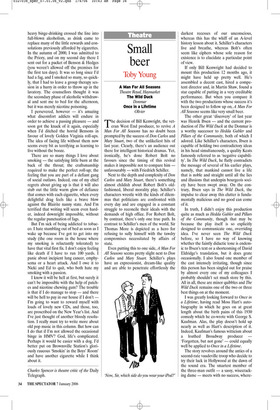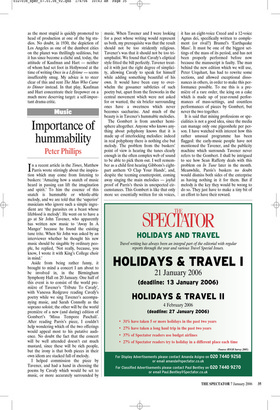Small beer
Toby Young
A Man For All Seasons Theatre Royal, Haymarket The Wild Duck Donmar Once in a Lifetime Olivier The decision of Bill Kenwright, the veteran West End producer, to revive A Man For All Seasons has no doubt been prompted by the success of Don Carlos and Mary Stuart, two of the unlikeliest hits of last year. Clearly, there’s an audience out there for intelligent historical dramas. Yet, ironically, he’s done Robert Bolt no favours since the timing of this revival makes it impossible not to compare him unfavourably — with Friedrich Schiller.
Next to the depth and complexity of Don Carlos and Mary Stuart, there’s something almost childish about Robert Bolt’s oldfashioned, liberal morality play. Schiller’s characters wrestle with the kinds of dilemmas that politicians are confronted with every day and are engaged in a constant struggle to reconcile their ideals with the demands of high office. For Robert Bolt, by contrast, there’s only one true path. In contrast to Schiller’s men of the world, Sir Thomas More is depicted as a hero for refusing to sully himself with the tawdry compromises necessitated by affairs of state.
Even putting this to one side, A Man For All Seasons seems pretty slight next to Don Carlos and Mary Stuart. Schiller’s plays have an expressionist, dream-like quality and are able to penetrate effortlessly the darkest recesses of our unconscious, whereas this has the whiff of an A-level history lesson about it. Schiller’s characters live and breathe, whereas Bolt’s often seem like ciphers whose sole reason for existence is to elucidate a particular point of view.
If only Bill Kenwright had decided to mount this production 12 months ago, it might have held up pretty well. He’s assembled a decent cast, hired a competent director and, in Martin Shaw, found a star capable of putting in a very creditable performance. But when you compare it with the two productions whose success it’s been designed to follow up on, A Man For All Seasons seems like very small beer.
The other great ‘discovery’ of last year was Henrik Ibsen — and the current production of The Wild Duck at the Donmar is a worthy successor to Hedda Gabler and Pillars of the Community, both of which I adored. Like Schiller’s characters, Ibsen is capable of holding two contradictory ideas in his head simultaneously, a quality Keats famously referred to as ‘negative capability’. In The Wild Duck, he flatly contradicts the message of several of his earlier plays, namely, that mankind cannot live a life that is noble and straight until all the lies and illusions that underpin bourgeois society have been swept away. On the contrary, Ibsen says in The Wild Duck, the impulse to clear away this clutter is fundamentally malicious and no good can come of it.
In truth, I didn’t enjoy this production quite as much as Hedda Gabler and Pillars of the Community, though that may be because the play itself is so explicitly designed to communicate one, overriding idea. I’ve never seen The Wild Duck before, so I have no way of knowing whether the faintly didactic tone is endemic to Ibsen’s text or a shortcoming of David Eldridge’s translation, but it does grate occasionally. I also found one member of the cast intensely irritating, though since this person has been singled out for praise by almost every one of my colleagues I probably shouldn’t set much store by this. All in all, these are minor quibbles and The Wild Duck remains one of the two or three best things on at the moment.
I was greatly looking forward to Once in a Lifetime, having read Moss Hart’s autobiography in which he goes on at great length about the birth pains of this 1930 comedy which he co-wrote with George S. Kaufman. Alas, the play doesn’t hold up nearly as well as Hart’s description of it. Indeed, Kaufman’s famous witticism about a loathed Broadway producer — ‘Forgotten, but not gone’ — could equally well be applied to Once in a Lifetime.
The story revolves around the antics of a second-rate vaudeville troop who decide to try their luck in Hollywood at the dawn of the sound era. The smartest member of the three-man outfit — a sassy, wisecracking dame — meets with no success, where as the most stupid is quickly promoted to head of production at one of the big studios. No doubt, in 1930, the depiction of Los Angeles as one of the dumbest cities on the planet was thrillingly seditious, but it has since become a cliché and, today, the attitude of Kaufman and Hart — neither of whom had set foot in Hollywood at the time of writing Once in a Lifetime — seems insufferably smug. My advice is to steer clear of this and rent The Man Who Came to Dinner instead. In that play, Kaufman and Hart concentrate their firepower on a much more deserving target: a self-important drama critic.






































 Previous page
Previous page